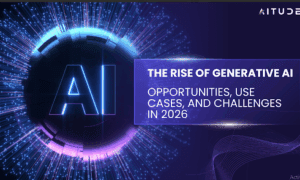“The future of enterprise software is not just automation. It is intelligence,” says Aditya Chandorkar, the Technical Product Manager at a leading enterprise software company. “We are no longer just building tools. We are taking charge of decision-making itself.”
Aditya Chandorkar leads initiatives in enterprise software that intersect with AI automation, IT workflow optimization, and enterprise SaaS solutions. His two decades in technology have guided product development toward solutions that update IT service management (ITSM) and IT operations management (ITOM). As Generative AI and machine learning merge into enterprise workflows, his work prompts a key question of whether AI will become an actual decision-maker or whether human judgment remains essential.
Enterprise Software Growth
The U.S. software market, valued at approximately $194.17 billion in 2024, will reach $676.46 billion by 2034, primarily through the adoption of AI, cloud computing, and automation solutions. Industry reports show enterprise software leads market growth as businesses increase investments in SaaS platforms to improve operations and reduce costs.
Aditya Chandorkar leads his organization’s Self Service initiative, which uses AI to automate IT support functions. The traditional service desk requires updates, as AI automation now enables issue prediction, significantly reducing downtime and increasing efficiency.
This advancement meets resistance. AI ethicists and industry veterans caution against overreliance on machine decisions. AI efficiency improvements often amplify existing biases in IT workflows, raising questions about responsibility and oversight in automated decision-making processes.
AI-Driven IT Operations
Aditya Chandorkar integrates Generative AI into enterprise IT workflows, implementing predictive analytics and AI virtual assistants to manage incidents, changes, and resource allocation. His expertise in automation technologies has revolutionized how enterprises approach IT management.
Enterprise systems now predict and prevent IT disruptions before they occur. His work will help reduce manual ticket handling for the customers, improving response times and reducing human intervention in IT support functions.
Under Chandorkar’s guidance, implementing the Common Data Model has created new standards for IT service data across enterprises using the platform. Standardized data remains essential for effective automation and seamless AI workflow function.
This standardization influences ITSM practices in Fortune 500 companies, creating structured data governance. Industry experts say integrating AI within structured data environments will define future enterprise IT.
Cloud Services Growth and Challenges
Cloud services now serve 94 percent of enterprises. The market continues to expand as organizations adopt comprehensive IT workflow solutions. Modern enterprises increasingly customize IT workflows beyond traditional architectures, creating more efficient operations.
Analysts project AI cloud services will dominate IT spending by 2030, with enterprise AI investments growing 37.3 percent annually. The convergence of AI and cloud computing will determine which companies lead future digital enterprise development.
AI enterprise solutions face regulatory and cybersecurity obstacles. The European Union’s AI Act, effective in 2025, requires strict compliance for AI enterprise software. Industry standards now emphasize transparent and ethical AI implementation to meet new regulations.
Cybersecurity threats persist. Reports show that 62 percent of enterprises using AI automation in IT operations encountered AI model security vulnerabilities. “We must build secure systems,” Aditya Chandorkar notes. “AI should strengthen security through continuous monitoring and threat modeling.”
Future Projections of AI and Human Expertise Balance
By 2030, AI automation will transform 80 percent of routine IT tasks, changing IT professional roles. IT specialists will focus on strategy over manual execution. The integration of advanced automation tools continues to reshape enterprise operations.
Successful implementation requires effective collaboration between automated systems and human operators. AI handles routine tasks, enabling humans to focus on strategic decisions and solution creation.
As AI updates enterprise software, professionals like Chandorkar apply innovation with responsibility. His contributions to AI workflow automation, Common Data Model standardization, and cloud IT services have established industry standards. The continued advancement of Generative AI technologies promises further developments in enterprise automation.
Technology success depends on effective implementation strategies. AI value extends beyond automation to empower businesses and individuals to work effectively.
His focus on balancing automation with human oversight demonstrates that successful enterprise IT requires intelligent systems that remain accountable, adaptable, and ethical. The future of enterprise software lies in creating solutions that enhance human capabilities while maintaining essential oversight and control.



































